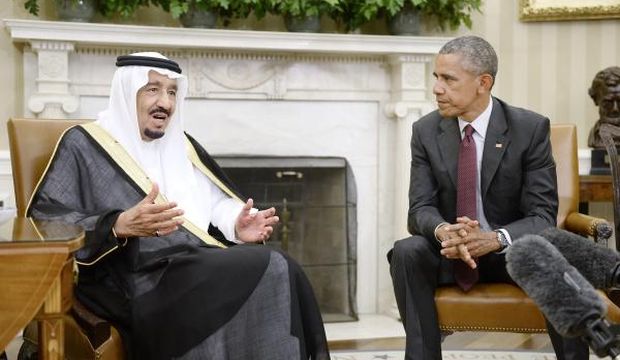Even political alliances have shelf lives, and sometimes see a decline in fortunes. It is for this reason that Saudi Arabia and the United States have chosen not to rely solely on the length of their unique seven-decade relationship, but have also formed an new and innovative understanding of the partnership, which has allowed it to stand and rise throughout that time, without being negatively affected by the two countries’ often differing political stances.
It was in this vein that both countries announced their “new strategic partnership for the 21st century” at the close of King Salman Bin Abdulaziz’s visit to Washington on Saturday. It is perhaps this framing of the relationship that will protect it from falling into the steaming cauldron of political differences. For political stances between any two countries can never overlap entirely; at best they will do so only in broad terms.
Spearheaded by King Salman, Saudi Arabia’s foreign policy in this new era focuses on maintaining good relations with other countries, but also ensures the Kingdom does not change its own stances in a bid to please everyone. Instead, it seeks to work on joint economic interests with its partners, a strategy that may be the “magic lamp” which allows these relations to prosper and grow.
Such fundamentals will ensure that the alliance with the US, and other countries, will not be affected by any differing political stances, or indeed any deep-rooted or fundamental differences in outlooks. Both sides can therefore rest assured in the knowledge that they have put up an impenetrable protective firewall that will guard their relationship from harm and leave them both free from any anxieties regarding its future. This can be achieved by concentrating on interests which both sides cannot afford to give up.
So, regarding its relationship with the United States, Riyadh is saying, with complete clarity, that the fundamentals of the relationship will not, and need not, change—what need to change are the mechanisms for making that relationship work.
While Saudi Arabia is keen to do everything it can to strengthen its relationship with a country like the US, it is also very aware of its own importance, especially to Washington, which knows full well it cannot easily forgo its relationship with a country like Saudi Arabia, which plays such an essential role in promoting stability in the Middle East, and without whose input the war on terror becomes a futile exercise.
Saudi Arabia has proven that it is the only country in the region that has kept the same policies and stances over the past decades, and indeed since its foundation as a nation-state. The mechanisms of implementing its foreign policy may have changed, but its fundamentals remain the same—just as they were when King Abdulaziz Al Saud founded the Kingdom of Saudi Arabia in 1932. This stability and constancy gives strength to Saudi foreign policy, which has proven itself throughout these long decades. Moreover, Riyadh has never participated in the kind of rash political adventures that could have diminished its reasonableness and sagacity, qualities it is known for internationally and whose extent has often embarrassed even its own allies. The world knows that in the post-Arab Spring era Riyadh is the most stable capital in the entire region—and the one with the most influence. So, in the end, the US–Saudi alliance is a bonus for Washington as much as it is for Riyadh.
While covering King Salman’s visit to the US a journalist from the BBC asked me, “What will Riyadh do in terms of countering Iran without the help of the US?” My answer was that Saudi Arabia is capable of halting Iranian expansion in the region and does not need Washington in order to do achieve this. It is superficial to link the ability of Saudi Arabia—the Middle East’s strongest political, economic, and military power—to protect itself and its citizens, with the United States or any other country. Recent proof of this ability is the crisis in Yemen, in response to which Saudi Arabia was able to put together a coalition of Arab countries within 24 hours, something it would be able to accomplish again with ease should Iran dare repeat what it attempted in Yemen.
Riyadh is not expecting its major allies to shower it with perks it does not deserve or financial incentives in the form of aid. Alliances require concerted efforts and demand responsibilities from all those involved. It is only based on this outlook that such alliances can grow; without it they cannot.
King Salman has through this visit laid in Washington a foundation stone for a strategic partnership that confirms the one that was founded seven decades ago by King Abdulaziz Al Saud and President Franklin D. Roosevelt, but also looks forward to the future. It does so especially bearing in mind the change that will take place in the White House after the 2016 US presidential elections.
What is certain is that whoever becomes the next president of the United States will not be able to abandon the political, economic, and security benefits that come as part of the alliance with the Kingdom of Saudi Arabia.
